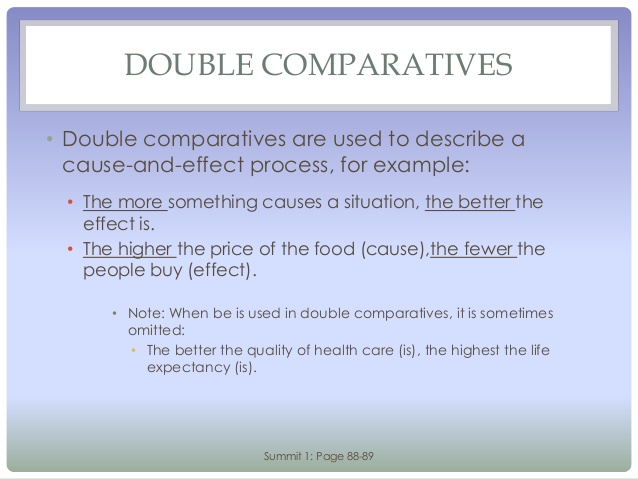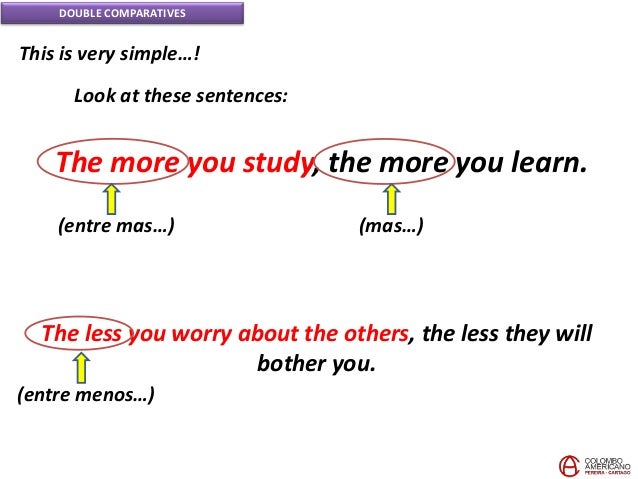Double comparatives are phrases commonly used in English to express increasing or decreasing returns. Double comparatives are often employed to underline the importance of doing or not doing a certain activity. Here are some examples of double comparatives:
The more you study, the more you learn.
The more time you take, the better the assignment your turn in.
The less money I spend, the less I have to worry about saving.
The less you worry about the others, the less they will bother you.
The more time you take, the better the assignment your turn in.
The less money I spend, the less I have to worry about saving.
The less you worry about the others, the less they will bother you.
Using Double Comparatives
As you can see from these examples, the format of double comparatives is as follows:
The (more / less) + (noun / noun phrase) subject + verb + , + the (more / less) + (noun) subject + verb
Double comparatives with 'more' and 'less' can be used with adjectives in the same way. In this case, the structure places the comparative adjective first:
The + comparative adjective + (noun) + subject + verb, the + comparative adjective + it is + infinitive
The easier the test is, the longer students will wait to prepare.
The faster the car is, the more dangerous it is to drive.
The crazier the the idea is, the more fun it is to try.
The more difficult the task is, the sweeter it is to succeed.
The faster the car is, the more dangerous it is to drive.
The crazier the the idea is, the more fun it is to try.
The more difficult the task is, the sweeter it is to succeed.
These forms can be mixed up as well. For example, a double comparative might begin with a more / less plus a subject and then end in a comparative adjective plus the subject.
The more money he time he spends with her, the happier he becomes.
The less Mary thinks about the problem, the more relaxed she feels.
The more the students study for the test, the higher their scores will be.
The less Mary thinks about the problem, the more relaxed she feels.
The more the students study for the test, the higher their scores will be.
You can also reverse the above by beginning with a comparative adjective and ending with more / less plus a subject and verb or noun, subject and verb.
The richer the person is, the more privilege he enjoys.
The happier the child is, the more the mom can relax.
The more dangerous the amusement park ride is, the less management worries about making a profit.
The happier the child is, the more the mom can relax.
The more dangerous the amusement park ride is, the less management worries about making a profit.
Double comparatives are often shortened in spoken English, especially when used as a cliche. Here are some examples of typical cliches using double comparatives.
The more the merrier
means...
The more people there are, the merrier everyone will be.
means...
The more people there are, the merrier everyone will be.
Double comparatives can also be turned into commands in the imperative form when recommending certain actions:
Study more, learn more.
Play less, study more.
Work more, save more.
Think harder, get smarter.
Play less, study more.
Work more, save more.
Think harder, get smarter.
Double Comparatives = Incorrect Usage
The use of the term double comparative also applies to the incorrect use of two comparative forms together. Here are some examples:
This wine is more tastier than that bottle.
She is more funnier than Tom is.
Alexander is more taller than Franklin.
She is more funnier than Tom is.
Alexander is more taller than Franklin.
In this case, 'more' is not required as the comparative adjective form has been modified by the addition of '-ier'.
Double Comparatives to Show Change
Finally, double comparatives are also used to show a continual increase or decrease.
There are more and more people coming to this vacation spot.
It seems like there is less and less time to spend with the family these days.
Recently, people are finding more and more time to spend with their families.
It seems like there is less and less time to spend with the family these days.
Recently, people are finding more and more time to spend with their families.
Practice Double Comparatives
Use the following sentence segments to create double comparatives (the good kind) of your own.
- people / come / party , food / we / need
- difficult / test , students / study
- nice / customer service representative / happy / customer
- high-tech / car , expensive / model
- full / church , good / pastor
- funny / comic , sales / cd / have
- severe / judge , harsh /sentence
- experienced / technician , satisfying / repair
- long / play , bored / audience
- money / spend , money / save
Possible Answers
Here are some possible answers for the exercise.
- The more people that come to the party, the more food we will need!
- The more difficult the test is, the more students should study.
- The nicer the customer service representative is, the happier the customer will be.
- The more high-tech the car is, the more expensive the modal will cost.
- The fuller the church is, the better the pastor is.
- The funnier the comic is, the better sales the CD will have.
- The more severe the judge, the harsher the sentence will be.
- The more experienced the technician is, the more satisfying the repair will be.
- The longer the play lasts, the more bored the audience becomes.
- The more money you spend, the less money you save.




VIDEO: https://www.youtube.com/watch?v=YLldmCDMNAY
- EXERCISES
He gets (boring). I can’t listen to him any longer.
2) I didn’t like this book at first, but it’s getting (interesting).
3) My daughter’s English results are getting (bad).
4) The boss will be angry with you. You arrive (late) at work.
5) In spring the weather gets (warm).
6) It’s time you tidied your room. It’s getting (messy).
7) Food is getting (expensive).
8) I think TV programs are getting (violent).
9) I find it (difficult) to see him.
10) She’s getting over her operation. She feels (good).
Comentarios
Publicar un comentario